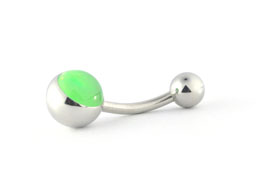
Tongue piercing has emerged as a fashion trend over the past few years and is immensely popular. The healing process depends on how well you take care of it. Good oral hygiene is very important to allow the piercing to heal as quickly as possible.
Along with ear piercing, belly piercing, and eyebrow piercing, tongue piercing has gained worldwide popularity with more and more people opting to undergo this form of piercing. It requires a lot of determination to pierce your tongue, because the idea of sticking a barbell through your tongue itself, scares the hell out of a lot of people. But most who opt for it, find sporting a pierced tongue ‘cool’ and ‘funky’.
The most important point to keep in mind when piercing your tongue is, to get it done by a professional. This itself, reduces the risks involved to a great extent. Generally the healing process takes around 4-6 weeks or may go up to around 2 months; the objective is to get rid of the pain, swelling, and discomfort as soon as possible.
There are many things that you need to do, as well as avoid, after you get your tongue pierced, a few of which are mentioned below. Following these tips until the pain and swelling subside will ensure that the wound around the piercing heals faster and is free from any possible infection.
Aftercare Instructions
The piercing site is sensitive, prone to infections, and touching it will only aggravate the wound. Always wash your hands with an antibacterial soap before touching the piercing. However, it is advisable not to touch it except when you need to clean the area and the jewelry, or tighten the balls at the ends of the barbell.
Keep it Clean
Clean the area once in the morning and once before going to bed with a solution of salt and water. To clean the wound around the piercing, use sea salt. Use cotton swabs, dip them in sea salt and dab gently on and around the piercing. Not cleaning the wound will only result in the accumulation of dead cells and bacteria around it. This might give rise to further complications like excessive bleeding, swelling, pain, infection, and discomfort.
Use Ice Cubes
Place crushed ice cubes in the piercing area and allow them to melt without sucking. This provides relief and helps reduce the pain and swelling.
Stay Hydrated
Drink lots of water and keep your mouth moist and hydrated at all times. Preferably, drink cold water, especially in the morning as soon as you wake up. This reduces the swelling and helps alleviate the pain.
Maintain Oral hygiene
Make sure to brush your teeth gently after every meal using a soft-bristle toothbrush. Also, rinsing your mouth with warm salt water or a mouthwash such as Listerine will help to get rid of any particles that might have got stuck in the piercing, which may infect it. However, use a mouthwash not more than twice a day. Keeping your mouth clean will ensure that no infection occurs due to improper oral hygiene.
Eat Soft Easy-to-chew Food
The swelling in your tongue makes it difficult to chew food. So go on a liquid diet for the first few days till the swelling subsides; have fresh fruit juices or vegetable juices. Include soft food like boiled vegetables, mashed bananas, rice, frozen yogurt, ice cream, etc. in your diet.
Take Medicines to Ease the Pain
Anti-inflammatory drugs like ibuprofen can help ease the pain and swelling.
Take Care
Be careful while talking, laughing, and sneezing as it may expose the piercing. Also, talking excessively can aggravate the wound and heighten your pain.
Avoid…
hot, spicy, and hard food like chocolates and chips.
drinking through a straw as it might exert pressure on the wound and irritate it further.
alcohol and carbonated drinks, smoking or tobacco-based products, and abstain from oral sex until the piercing has healed completely.
chewing gums as it may get stuck in the jewelry.
playing with your piercing or rubbing it against your gums, lips, or teeth. This may lead to formation of scar tissues.
rotating or trying to move the barbell.
trying to remove the barbell or pulling it off on your own.
aspirin to relieve pain. Aspirin aggravates the wound, causing it to bleed profusely.
physical activities like swimming, exercising, and running till your piercing is healed completely as they exert unnecessary pressure on the piercing.
experimenting with the piercing; if you are not comfortable with it, get it removed by the professional.
You might want to check up on other risk factors like your allergies to the kind of jewelry, the studio where to get it done from, the sterility and hygiene of the studio and the instruments used, and the professionalism and experience of the piercer. If necessary, ask for a trusted piercer from acquaintances who have already undergone the process.
Proper aftercare and upkeep of the piercing will ensure that it sustains for a longer period of time without any infections, side-effects, or injuries. Follow your piercer’s instructions carefully. Clear all your doubts about the aftercare process and ask queries about the same, if necessary. Make sure you have the piercer’s contact number handy. If you face any problems with the piercing, do not hesitate to call him.
Do not wait for the symptoms to worsen, consult a doctor if necessary. And most importantly, do not ignore the tongue piercing aftercare regimen.


